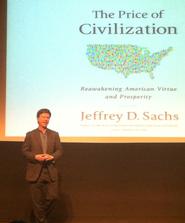
The Hamilton students in NYC attended a lecture by renowned economist Jeffrey Sachs titled “The Price of Civilization: Reawakening American Virtue and Prosperity” on Oct. 25. Sachs is the Quetelet Professor of Sustainable Development, professor of health policy and management, and director of the Earth Institute at Columbia University, and special advisor the U.N. Secretary-General Ban Ki-moon.
Sachs began his lecture by addressing the problems of socioeconomic inequality within the U.S. today, drawing references to levels of prosperity and equality present in the post-W.W. II period. A key distinction between the two time periods: tax rates. The U.S. possessed much higher tax rates across all levels of income, not just the top percentiles, even up through Eisenhower.
America slowly realized increasing levels of inequality up through Reagan’s presidency, when the disparity between the haves and have-nots became abundantly clear and his government aggressively deregulated the U.S. economy. The trend of deregulation and limited government involvement continued through Clinton and even up to Obama’s current administration.
Sachs pointed out that a Democratic president oversaw the repeal of Glass-Steagall, which allowed for the creation of international financial conglomerates such as Citigroup, JP Morgan Chase, and Bank of America to exist in their current forms. These corporations exist to make a profit. Neither an investment bank nor General Electric exists as a non-profit organization, offering goods and services for the betterment of the economy.
But, as Sachs asserts, profit has come to motivate Washington just as much as corporate America. The development of Wall St. and the rest of the private sector directly stems from Washington’s deregulatory policies over the past decades. The current socioeconomic disparity present within the U.S. has in fact been years in the making, and is by no means a recent phenomenon.
Sachs asserts that Washington, as well as the rest of America, need to realize that economics as a science does not address fairness, only efficiency. The answer to addressing the current class-crisis in the U.S., and consequently a sustainable trajectory of equitable growth, therefore must come from the government. Free markets, left unfettered, will seek out profits, as is their inherent right.
Posted November 2, 2011
